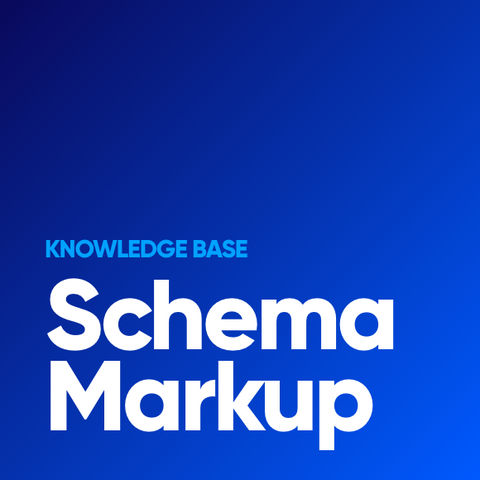What is Schema Markup?
Schema Markup, often referred to simply as Schema, is a structured data vocabulary that helps search engines understand the content on web pages. It provides a standardized way to describe and categorize information, making it easier for search engines to interpret the context and intent of the content. Schema Markup consists of predefined microdata tags that can be added to HTML to provide specific details about the content on a web page.
How Does Schema Markup Work?
Schema Markup uses a system of tags to label various elements on a web page, such as products, reviews, events, and more. These tags are added to the HTML code of a page and help search engines identify and extract relevant information. Here's a basic breakdown of how Schema Markup works:
-
Identification: Webmasters and content creators identify the content on their web pages that could benefit from structured data markup. This could include products, recipes, events, reviews, etc.
-
Tag Integration: The appropriate Schema Markup tags are integrated into the page's HTML code. These tags provide additional context about the content to search engines.
-
Search Engine Interpretation: When search engines crawl the web page, they can recognize the Schema Markup tags and interpret the information they provide. This helps search engines understand the context and purpose of the content.
-
Enhanced Search Results: Search engines use the Schema Markup data to enrich their search results with additional information, often displayed as rich snippets or results. For example, a recipe Schema Markup might include cooking time and nutrition facts, which can appear directly in search results.
The Importance of Schema Markup
Schema Markup offers several key benefits that can significantly impact a website's visibility and click-through rates. Here's why Schema Markup is essential:
-
Enhanced Search Results: When you implement Schema Markup, your content is more likely to appear as rich snippets in search engine results pages (SERPs). Rich snippets give users more detailed information about your content, making it more attractive and clickable.
-
Improved Visibility: Rich snippets and enhanced search results tend to catch users' eye, increasing the likelihood of clicks to your website. This enhanced visibility can lead to higher organic click-through rates.
-
Better Search Engine Understanding: Schema Markup provides search engines with a clearer understanding of your content. This can help search engines index and rank your content more accurately, ensuring it appears in relevant search results.
-
Relevance and Quality: Your website provides high-quality and relevant information by structuring your content with Schema Markup. This can improve your site's reputation and credibility for users and search engines.
Types of Schema Markup
Schema Markup offers various schema types, each tailored to a specific content. Some common schema types include:
-
Product: This schema type describes various product details, such as name, brand, price, and availability.
-
Recipe: Recipe schema details recipe information, including ingredients, cooking time, and nutrition facts.
-
Local Business: Local business schema provides information about a local business, such as its name, address, contact details, and opening hours.
-
Event: Event schema details upcoming events, including the event's name, date, location, and ticket information.
-
Review: Review schema allows you to display star ratings, review text, and other review-related data in search results.
-
Article: Article schema helps provide additional context to articles, such as the author's name, publication date, and the article's headline.
-
FAQ: The FAQ schema directly displays frequently asked questions and answers in search results.
These are just a few examples of the many schema types available. The choice of schema depends on the kind of content you want to mark up and the specific information you want to convey to search engines.
How to Implement Schema Markup
Implementing Schema Markup on your website might sound complex, but it can be done effectively with the right approach. Here's a step-by-step guide on how to add Schema Markup to your web pages:
Step 1: Identify the Appropriate Schema Type
Determine which schema type is most relevant to your content. You must select the appropriate schema type to provide accurate information, whether a product, recipe, event or any other kind.
Step 2: Add Schema Markup to Your HTML Code
You can add Schema Markup to your HTML code in several ways. The most common methods include:
-
Manual Coding: You can manually add schema tags to your HTML code. This approach requires a good understanding of HTML and the specific schema type.
-
Schema Markup Generators: Numerous online tools and generators can help you create Schema Markup code. You input the relevant information, and the tool generates the appropriate code.
-
Plugins and CMS Integration: If you're using a content management system (CMS) like WordPress, plugins are available that simplify the process of adding Schema Markup. These plugins often have user-friendly interfaces.
Step 3: Validate Your Schema Markup
After adding Schema Markup to your web page, it's essential to validate it to ensure no errors or issues. Google offers a structured data testing tool to help you verify your schema code.
Step 4: Monitor Search Results
Once your Schema Markup is implemented correctly and validated, it's time to monitor your search results. Keep an eye on the search engine results pages to see if your content displays rich snippets or results. If not, make adjustments as needed.
Examples of Schema Markup in Action
Schema Markup can enhance search results across various industries and content types. Let's explore some examples to see how it works:
Product Schema Markup:
Imagine you run an e-commerce website selling smartphones. Adding Product Schema Markup to your product pages provides search engines with detailed information about each product, such as the product name, manufacturer, price, availability, and user reviews. When users search for specific smartphone models, your product listings may appear with rich results that include images, star ratings, and pricing information directly in the search results.
Recipe Schema Markup:
If you have a cooking blog and create a Schema Markup for your recipes, your recipe listings in search results can include essential details like the preparation time, cooking time, calorie count, and user reviews. Users searching for a specific recipe may see your content displayed with rich results that show the recipe's ingredients, cooking steps, and other relevant information.
Local Business Schema Markup:
For a local restaurant, adding a Local Business Schema Markup to your website can help search engines understand your business's key details, such as the restaurant's name, address, phone number, operating hours, and even customer reviews. When potential diners in your area search for nearby restaurants, your listing can appear as a rich result with all the relevant information right on the search page.
Event Schema Markup:
Event Schema Markup is valuable for promoting and selling event tickets online. For instance, if you organize a music concert, your event page can include details like the event name, date, location, ticket prices, and a link to purchase tickets. When music enthusiasts search for local concerts, your event listing can show up with rich results that provide all the necessary information and a direct link to ticket sales.
Review Schema Markup:
Online reviews are highly influential, and Review Schema Markup can make your product or service reviews stand out in search results. Users looking for product recommendations can see your reviews displayed with rich results showcasing star ratings and review text snippets. This added information can boost your credibility and help users make informed decisions.
Schema Markup and Rich Results
Rich results are the visible outcomes of Schema Markup, and they play a significant role in improving users' search experience. When search engines recognize Schema Markup on your web pages, they can display rich results with enhanced details and context directly in the search results pages. Here are some common types of rich results that Schema Markup can produce:
Rich Snippets: These enhanced search results include additional information such as star ratings, product prices, and stock availability. Rich snippets help users quickly assess the relevance and quality of a web page's content.
Knowledge Graphs: When Schema Markup is applied to entities like famous people, places, or organizations, search engines can generate knowledge graphs with detailed information, offering users a comprehensive overview.
Carousels: Schema Markup is often used to create carousels that showcase multiple items within a single result. For instance, a recipe carousel can display various recipes related to a specific search query, allowing users to choose the one that best suits their needs.
Rich Cards: These visually appealing cards provide concise information about a page's content. Rich cards are often used for recipes, articles, and videos, each displaying an image, title, and critical details.
Enriched Maps: Local businesses can benefit from Schema Markup by having their information prominently featured in map-based results, making it easier for users to find nearby services.
Schema Markup and SEO
Schema Markup isn't a direct ranking factor, meaning it doesn't influence where your page ranks in search results. However, it indirectly contributes to your website's SEO by enhancing your listings in search results, improving click-through rates, and providing a better user experience.
Here's how Schema Markup affects your SEO efforts:
-
Higher Click-Through Rates (CTR): Rich results with Schema Markup are more eye-catching and informative, encouraging users to click on your page. Increased CTR can boost your SEO by indicating that your content is relevant and engaging to search engines.
-
Improved User Experience: Rich results provide users with more detailed and relevant information upfront. This improves the user experience and can lead to longer dwell times on your site, another positive signal for SEO.
-
Enhanced Mobile SEO: Schema Markup is especially beneficial for mobile users. Rich results make it easy for mobile users to access crucial information directly in search results without clicking through your site. This aligns with Google's focus on mobile-first indexing and mobile user experience.
-
Better Structured Data: Implementing Schema Markup requires well-structured data on your website. Organizing your content in a structured way can lead to more accessible, indexable, and understandable content for search engines.
-
Local SEO Benefits: Local businesses can significantly improve their local SEO with Schema Markup. Local Business Markup, for instance, can help companies to stand out in local search results.
While Schema Markup doesn't guarantee a higher position in search results, the indirect SEO benefits are significant. It can improve your website's visibility, user engagement, and online presence.
The Future of Schema Markup
As search engines and web technologies continue to evolve, the importance of schema markup will likely grow. Here are a few ways Schema Markup may play an even more crucial role in the future:
-
Voice Search: With the rising popularity of voice-activated devices and voice search, Schema Markup will become essential for providing context to voice search results. This will help users receive accurate and relevant voice responses.
-
Structured Data for AI: Schema Markup can contribute to developing AI systems. Providing structured data to AI algorithms enables web content to be better understood and used for various applications.
-
Cross-Platform Integration: Schema Markup may extend to more platforms and technologies, providing structured data that can be used across various digital channels.
-
Enhanced Content Discovery: Schema Markup may evolve to enhance content discovery, allowing users to explore web content more effectively based on specific needs and interests.
Schema Markup remains vital for web admins, businesses, and content creators in an ever-evolving digital landscape. By providing structured data that helps search engines understand, and in the form of rich snippets, knowledge graphs, or other rich results, Schema Markup continues to shape how the structure of rich snippets, knowledge graphs, or different rich results, Schema Markup continues to shape the way; information is presented in search results, enhancing the online experience for users worldwide.

Schema Markup





